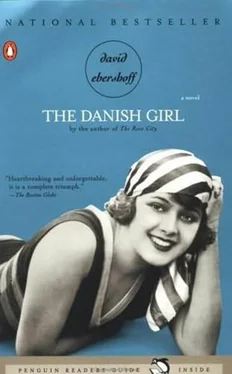Einar lifted one of the black shades in the little room. Behind the smudged glass was a girl in a leotard and black stockings, one foot on a bentwood chair. She was dancing, although there was no music. Peering out of another little window was the face of a man, his oily nose pressed white to the glass. His breath left a stain of fog. The girl seemed aware of Einar and the other man; before she’d yank off a bit of clothing she would look around, although not directly at the their flat-nosed faces, and dip her chin.
She peeled a pair of gloves similar to Lili’s off the fleshy pipe of her arm. The girl was not pretty: black hair electric and dry, a horse’s jaw, hips too wide and stomach too narrow. But there was something lovely in her modesty, Einar thought; in the way she neatly draped her gloves and then her leotard and finally her stockings over the back of the bentwood chair, as if she knew she would need them again.
Soon she was naked except for her shoes. She started to dance more energetically, her toes pointing, her hands held out. She threw her head back, exposing her white-blue trachea pressing against her skin.
For almost six months Einar had been visiting Madame Jasmin-Carton’s, heading out in the afternoon when Greta was meeting with a collector or one of the magazine editors at La Vie Parisienne or L’Illustration who hired her to sketch their stories. But Einar didn’t go to Madame Jasmin-Carton’s for the same reason as the other men, who would press their pocked noses against the little windows, their tongues like sea urchins mashing up against a fishmonger’s glass. He only wanted to watch the girls strip and dance, to study the curve and heft of their breasts, to watch the thighs, eerily white and tremulous like the skin on a bowl of steamed milk, flap open and closed-he could almost hear the knee bones slap together through the greasy glass window. He also liked the underside of their forearms, where their veins, hot with shame and resentment, would flow greenly; and the pad of flesh that swelled beneath the navel-that part of a woman made him think of the pillow carried by a ring bearer at a wedding. He visited Madame Jasmin-Carton’s to examine women, to see how their bodies attached limb to trunk and produced a female. How the girl with the electric black hair would hold her chin down as she distractedly cupped each custardy breast. How the girl after her, a blonde with a wiry body, walked around the half-circle black room with her fists on her hips, which were all bone. Or how the girl from last Tuesday, whom Einar had never seen before, parted her freckled thighs and flashed her genitalia. The thighs closed quickly, and then she danced angrily, the sweat pouring down her neck, while the pink image of her sex burned in Einar’s eyes, even when he shut them and tried to forget who he was or where he was; even later, when he lay down next to Greta and tried to sleep while her bedside lamp burned and her fat-tipped pencil scratched away at the leather-spined notebook that held drawing after drawing, a career’s worth, of Lili.
Einar and Greta now lived in the Marais. They’d left Copenhagen over three years before. It had been Greta’s idea. One day a letter had arrived at the Widow House, and Einar could recall Greta reading it quickly and then lifting the lid of the iron stove and dropping it in. He could recall the brief yellow light that poured from the stove as it devoured the letter. Then she told Einar that Hans wanted them to move to Paris. “He thinks, and so do I, it would be best,” she said. “But why’d you burn his letter?” Einar asked. “Because I didn’t want Lili to see it. I don’t want her to know that Hans wants to see her again.”
They rented an apartment in a cut-stone townhouse on the rue Vieille du Temple. The apartment was on the fourth floor, the top, with skylights cut into the steep roof and windows facing the street. The rear faced the courtyard, where during the summer geraniums grew in window boxes wired to the ledges and laundry stiffened on the line. The townhouse was just down the street from the Hôtel de Rohan, with its entrance curving into the sidewalk and the two great black doors of its gate. The street was narrow but drained well in winter, and sliced through the Marais with its grand hôtels reconfigured as government offices or warehouses for dry-goods importers or simply abandoned, and its Jewish shops, where Einar and Greta would buy dried fruit and sandwiches on Sundays when everything else was closed.
The apartment had two workrooms. Einar’s, with a few landscapes of the bog perched on oversized easels. And Greta’s, with her Lili paintings, sold before they dried, and the spot on the wall, perpetually wet and thick, where she dabbed out her colors until they were just right: the brown of Lili’s hair, which turned to honey after one swim in an August sea; the purply red of the blush that clasped around the base of her throat; the silvery white of the inside of her elbows. Each workroom had a daybed covered with kilims. Sometimes at night Greta would sleep there when she was too tired to climb into the bed they shared in the little room at the back of the apartment, where there was a darkness that felt to Einar like a cocoon. In their bedroom, with the lamps turned off, it was too dark for Einar to see even his hand in front of his face, and this he liked, and he’d lie there until dawn, when the laundry pulley would squeak and one of their neighbors would get busy hanging out another load.
In the summer mornings Lili would rise and ride the omnibus down to the Bains du Pont-Solférino on the quai des Tuileries. The pool had a row of changing cabanas that were made of striped canvas, like tall, narrow tents. Inside Lili would change into her bathing dress, carefully arranging herself beneath the frilled skirt so that she could remain, as she thought of it, modest. Since they left Denmark her body had changed, and now her breasts were fleshy with muscle gone soft, enough to fill the little dented cups of her bathing dress. Her rubber bathing cap, with its pneumatic smell, would pull her hair back, tugging on her cheeks and giving her an exotic look with her eyes slanted and her mouth flattened out. Lili had learned to carry a hand mirror with her, and in the canvas cabana, in the summer mornings, she would look at herself, waving the mirror across each inch of her skin, until the pool attendant would flap the canvas and demand if mademoiselle needed some assistance.
With that, Lili would slip into the pool, holding her head above the water. She would bathe for thirty minutes, her shoulders turning as each arm lifted over her head with the motion of a windmill, until the other women in the pool-for this pool, like the tearoom where she sometimes took her coffee and croissant, was reserved for ladies-would stop and hang on to the lip of the pool to watch little Lili, so graceful, so long-armed, so, they would cluck, puissante.
It was what she liked most: her head gliding across the surface of the pool like a little duck; the other ladies in their wool bathing dresses watching her with their mixture of indifference and gossipy intrigue; the way she could pull herself from the pool, her fingertips pruned, and pat the towel down her arms as she dried in the glittering light that reflected off the Seine. She would watch the traffic across the river. And Lili would think that all of this was possible because she and Greta had left Denmark. She would think, in the summer mornings, on the lip of the pool filled with Seine water, that she was free. Paris had freed her. Greta had freed her. Einar, she would think, was slipping away. Einar was freeing her. A shiver would run up her damp spine; her shoulders would shudder.
In the cabana, after returning the pink towel to the attendant, she would peel off the bathing dress, and if she was in a particularly strong trance about her life and the possibility of it all, she would let out a little gasp when she discovered that down there, between her white, goose-pimpled thighs, lay a certain shriveled thing. It was so vile to her that she would snap closed her thighs, tucking it away, her knee bones smacking; she could hear the muffled smack, and the sound of it-like two felt-wrapped cymbals meeting in crescendo-would remind Lili, would remind Einar, of the girl at Madame Jasmin-Carton’s who had danced resentfully and snapped her knees together in such a harsh manner that he could hear the smack of bone even through the smudged glass.
Читать дальше












